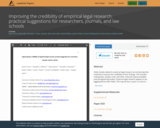
The number of empirical legal studies published by academic journals is on the rise. Given theory’s dominance over the last few decades, this is a welcome development. This movement, however, has been plagued by a lack of rigor and a failure of editors to require disclosure of data and procedures that allow for easy replication of published results. Law journals, the editorial boards of which are manned solely by law students, might face the toughest hurdles in ensuring publication of only high quality empirical studies and in implementing and enforcing disclosure policies. While scholars in other fields including economics, psychology, and political science seem to be taking steps to address widespread quality issues, little is being done to address the problems in the law literature. The purpose of this essay is to argue that most proposed solutions offered over the last decade or so have not taken hold because they do not generate incentives powered by the interests of actors in positions to affect change. Those that have caught on might be causing more harm than good. I offer a set of proposals grounded in a framework based on tapping into the interests of both law journal student-editors and authors who submit empirical legal studies to law journals for publication. Improving the quality of empirical studies will require time and sustained effort, but the hope is that successful implementation of them (or others that provide strong incentives for change) will reduce the need for effort over time.
- Author:
- Kathryn Zeiler
- Date Added:
- 08/08/2020
